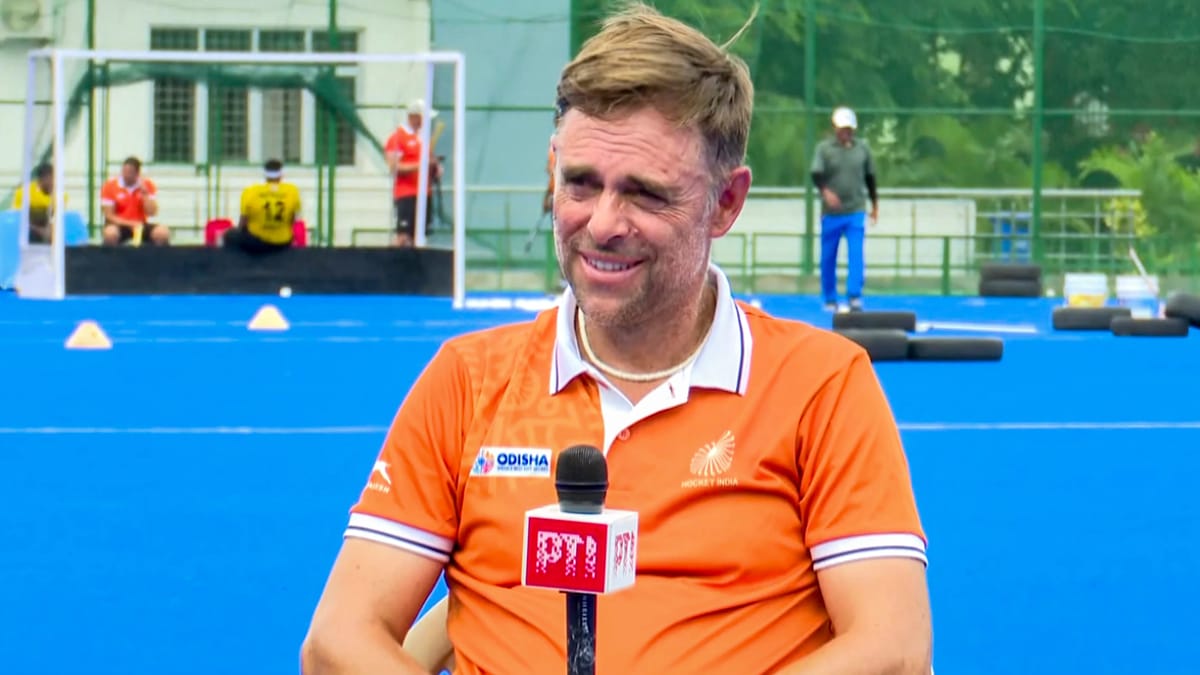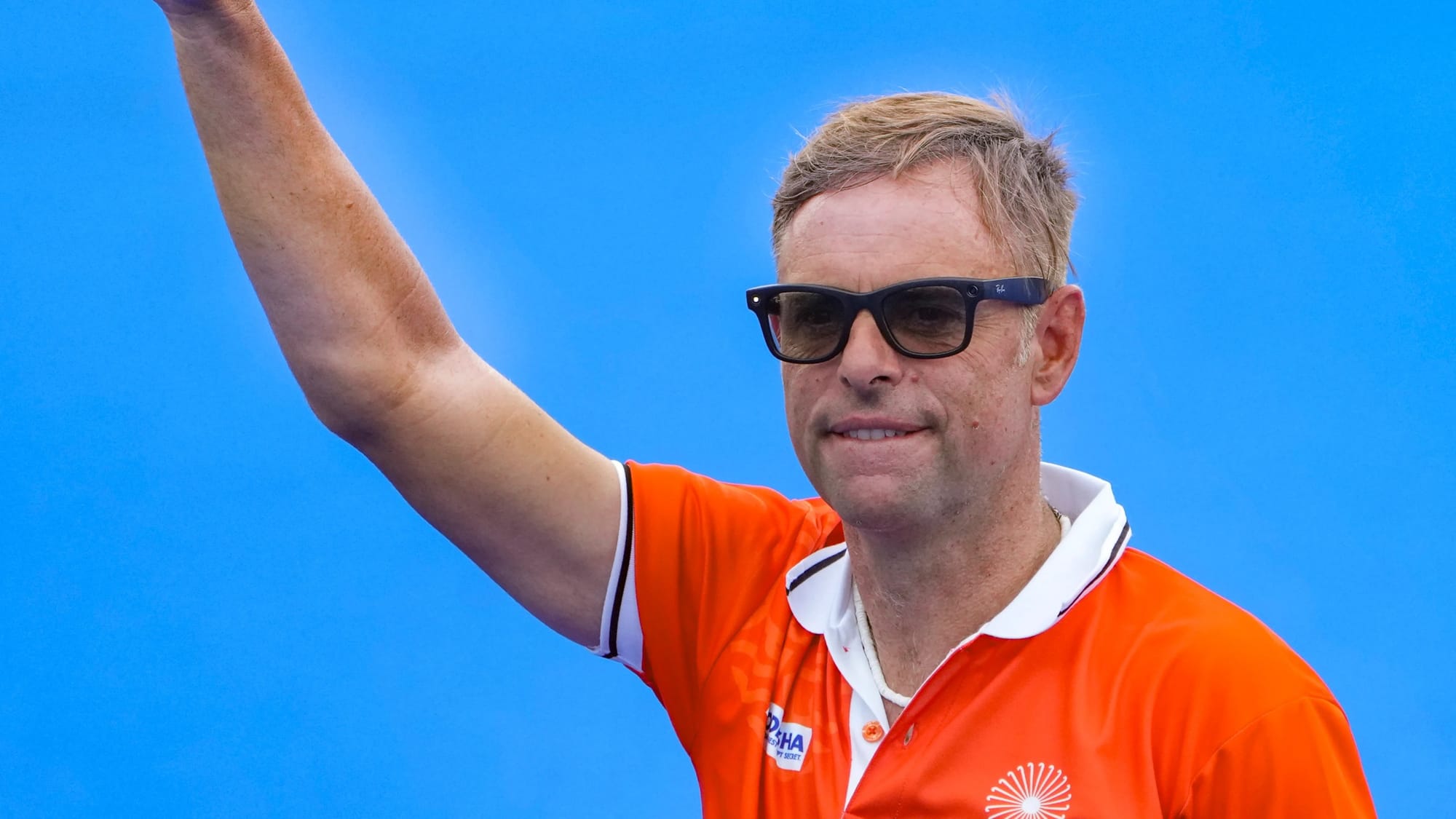Fulton's Forensic Post-Mortem: Dissecting the Hard-Fought Victory That Uncovered India's Vulnerabilities
In a candid post-match analysis, Indian Men's Hockey Coach Craig Fulton breaks down the team's narrow 4-3 victory over China in the Asia Cup opener.

Written by Lavanya, Intern, Allegedly The News
RAJGIR, INDIA, September 2, 2025
The scoreboard read 4-3 in favor of India, a victory sealed by a dramatic hat-trick from captain Harmanpreet Singh. The home crowd at the Rajgir Hockey Stadium roared with relief and joy. Yet, in the post-match press conference, Head Coach Craig Fulton’s demeanor was a study in tempered satisfaction. He was "happy with the result," but his critique of the "performance" was pointed and unyielding. This was not a celebration of a job well done; it was a forensic post-mortem of a victory that highlighted the very vulnerabilities his squad must overcome to win the Asia Cup and secure a direct berth in the FIH Hockey World Cup 2026. This isn't just about a single match; it’s about a team's journey of growth, its struggle for consistency, and a coach's relentless pursuit of perfection.
The victory over China, a team ranked significantly lower than India, was anything but a walkover. The match was a rollercoaster of emotions, with India leading comfortably at times only to be pegged back by a resilient Chinese side that exploited defensive lapses. The "scrappy" nature of the win, as some have termed it, has become a recurring narrative for the Indian squad under Fulton, raising questions about their ability to maintain a high level of play against all opponents.
Anatomy of a Win: Fulton’s Unfiltered Assessment
Fulton’s comments were a masterclass in separating the outcome from the execution. He was clear: "I’m happy with the result. I think it was a game of two halves in a way. We played really well in the first half, not so well in the third." This simple observation reveals the core issue plaguing the Indian team. They are a team of immense talent and individual brilliance, but their performance often fluctuates between brilliance and bumbling.
The first half saw India dominate, creating opportunities and showcasing their attacking flair. Goals from Jugraj Singh and a penalty corner from Harmanpreet gave them a 2-1 lead at halftime. The momentum seemed firmly in their grasp. However, the third quarter was a different story. China, refusing to back down, scored two goals, one of which came from a penalty corner and another that Fulton later alluded to as "soft." The turning point, or rather, the moment of missed opportunity, was Harmanpreet Singh's failed penalty stroke. Had he converted, the game would have likely been put to bed. Instead, it gave China a lifeline and sent a ripple of anxiety through the Indian camp.
Fulton’s frustration was rooted in this inconsistency. He stated, "We played well enough to win the game, but we didn’t play to our expectations." This is a coach who has a clear vision of what his team is capable of, and the performance against China fell short. He wants to see a squad that is not only talented but also disciplined, ruthless, and mentally resilient. The Chinese team, despite being outranked, managed to exploit India's defensive vulnerabilities and momentary lapses in concentration. The fact that India conceded three goals to a team they were expected to dominate is a glaring red flag.
The Tactical Lessons and the Path to Improvement,
The match against China was a textbook example of a tactical challenge that the Indian team must master. As a higher-ranked team, India will often face opponents who employ a "low-blocking" defense, sitting deep and inviting pressure to capitalize on turnovers. The Chinese team did this effectively, forcing India to move the ball around and test their patience. India's natural inclination is to play a fast-paced, attacking game, but against a deep-set defense, this can often lead to frustration and mistakes.
Fulton’s post-match comments, and those of his players, highlight the specific areas for improvement. Captain Harmanpreet Singh himself admitted, "It was a tough match, but winning was important. Till the last whistle, we fought. It's a good lesson for us." He pointed out the need to be "alert defensively," a direct acknowledgment of the "soft goals" conceded.
The defensive unit needs to be more solid and organized, particularly in dealing with turnovers and penalty corners. While India's penalty corner conversion rate was excellent thanks to Harmanpreet's hat-trick, their penalty corner defense was far from perfect, a fact highlighted by the three goals China scored from set pieces. This is a crucial area to address, as against top-tier teams, penalty corners are often the difference-makers.
Furthermore, the team's ability to maintain focus for all four quarters needs to improve. The mental toughness to push through a grueling 60 minutes, especially in the humid conditions of Rajgir, is paramount. Fulton's philosophy, as he has stated in the past, is built on trust, camaraderie, and connection, with a focus on defense as the first form of attack. The lapses in the third quarter show that this philosophy is still a work in progress for the squad.

A Tense Narrative: Player Quotes and Fan Reactions
The tension of the match was not lost on the players. Harmanpreet Singh, the hero of the day, acknowledged the learning experience. "We need to be alert in the defensive line and make sure that our defensive line is strong," he said. This quote, coming from the captain and a defensive stalwart himself, holds immense weight. It shows that the players are aware of the issues and are on the same page as the coach.
The fan reactions on social media mirrored this sentiment. While there was a sense of relief and pride in the victory, many were quick to point out the glaring issues. Tweets and comments ranged from "A win is a win, but we were too dependent on Harmanpreet's PCs" to "The defense needs to tighten up, this won't work against Japan or Korea." The collective mood is a mix of cautious optimism and genuine concern. This fan-generated pressure is another layer the team must navigate, as the home crowd's expectations are immense.
Looking Ahead: A Call to Arms
The Asia Cup is a journey, and this first match has been an important, albeit difficult, first step. The victory secured India a strong position in Pool A, but the real tests lie ahead. The team has already faced Japan, securing another narrow 3-2 victory, and now faces Kazakhstan. These matches are not just about securing points; they are about preparing the team for the tougher challenges of the Super 4s and the final. The tactical lessons from the China match must be implemented immediately.
Fulton's call for improvement is a challenge to his players to step up. He wants them to be more consistent, more disciplined, and more clinical. The squad has the talent to win the tournament, but talent alone is not enough. They must marry that talent with a strong tactical foundation and unwavering mental fortitude. The coach is not just building a team for the Asia Cup; he is building a squad for the future, with his eyes set on the 2026 World Cup and beyond. The victory against China, with all its imperfections, may prove to be the most valuable lesson of the tournament. It was a wake-up call that a win is not just about the score, but about the quality of the performance.
Theories of a Coach's Psychology
Fulton’s approach is a fascinating case study in modern sports psychology. By simultaneously praising the result and critiquing the performance, he achieves a delicate balance. The praise keeps the team's morale high, validating their effort and ensuring they don't lose confidence. The critique, however, is a non-negotiable call for accountability. It is a subtle way of telling his players, "You won, but you can be so much better. This is not our standard." This method is designed to prevent complacency and push the team to strive for greatness, not just competence. It is a high-risk, high-reward strategy that could either inspire the team to new heights or create an environment of constant pressure.
Questions for the Fan Community
Do you believe the team's reliance on penalty corners for goals is a sustainable long-term strategy against top-tier opponents? What specific tactical adjustments should Coach Fulton prioritize to prevent defensive lapses in the crucial stages of a match?
Sources
NDTV Sports, Times of India, Olympics.com, and Hockey India official statements.




